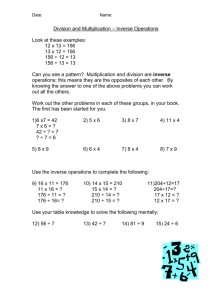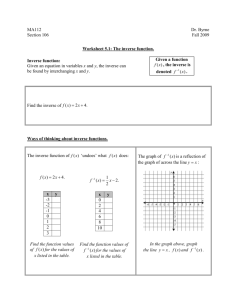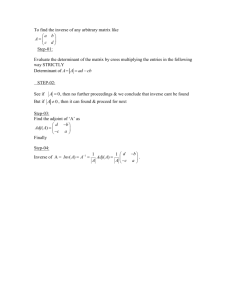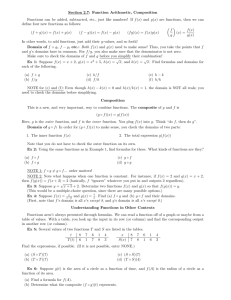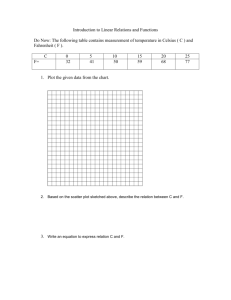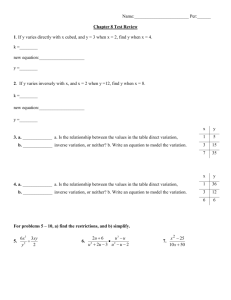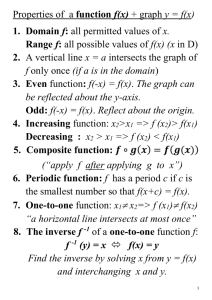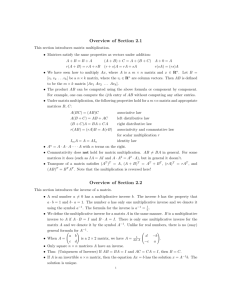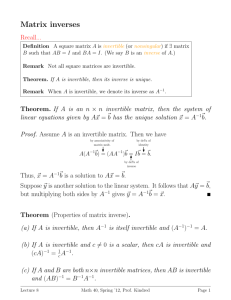INTERMEDIATE ALGEBRA REVIEW
advertisement
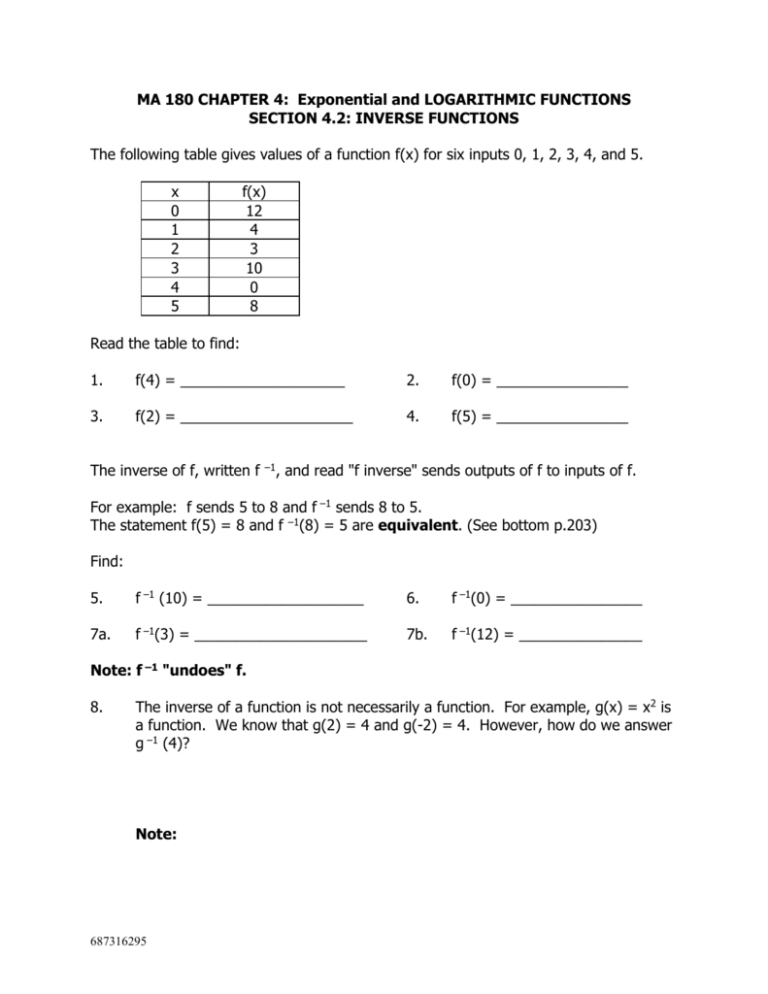
MA 180 CHAPTER 4: Exponential and LOGARITHMIC FUNCTIONS SECTION 4.2: INVERSE FUNCTIONS The following table gives values of a function f(x) for six inputs 0, 1, 2, 3, 4, and 5. x 0 1 2 3 4 5 f(x) 12 4 3 10 0 8 Read the table to find: 1. f(4) = ____________________ 2. f(0) = ________________ 3. f(2) = _____________________ 4. f(5) = ________________ The inverse of f, written f –1, and read "f inverse" sends outputs of f to inputs of f. For example: f sends 5 to 8 and f –1 sends 8 to 5. The statement f(5) = 8 and f –1(8) = 5 are equivalent. (See bottom p.203) Find: 5. f –1 (10) = ___________________ 6. f –1(0) = ________________ 7a. f –1(3) = _____________________ 7b. f –1(12) = _______________ Note: f –1 "undoes" f. 8. The inverse of a function is not necessarily a function. For example, g(x) = x2 is a function. We know that g(2) = 4 and g(-2) = 4. However, how do we answer g –1 (4)? Note: 687316295 9. Invertible functions: When the inverse of a function, f, is also a function, we say that f is invertible. f and f –1 are inverse functions of each other. In general, linear functions of the form y = mx + b with m 0, are invertible. Futhermore, only functions that are one-to-one are invertible. A function is one-to-one if each output is used only once. A one-to-one function will pass both the vertical line test and the horizontal line test. Recall g(x) = x2, which is sketched to the right. g passes the vertical line test, but fails the horizontal line test. g is a function, but not a one-to-one function. g is not invertible. 10. Graphing an inverse function. For f(x) = 3x + 2, complete the table. x -2 -1 0 1 2 f(x) x -4 -1 2 5 8 axes scaled by 2 f –1(x) f f -1 11a. Reflection Property: For an invertible function f, the graph of f reflection of the graph of f across the line y = x. 11b. Finding the inverse equation of a function. f(x) = x - 3 (f(x) –1 is the subtracts 3 from x, then f-1(x) should add 3 to x to “undo” f.) f –1(x) = x + 3 g(x) = x 4 (g(x) divides x by 4, then g-1(x) should multiply x by 4 to “undo” g.) g-1(x) = 4x Note: To check g-1(x), graph g and g-1(x) to see if they are reflections of each other about the line y = x. **DRAW** the functions. 687316295 FINDING THE INVERSE FUNCTION OF A LINEAR FUNCTION ALGEBRACIALLY: (Four-Step Process, Please See page 606 of our textbook) We Want to Find the Inverse Function of f(x) = x - 3 STEP 1: Replace f(x) with y Now You Try to Find the Inverse Function of g(x) = 2x + 5 y=x–3 STEP 2: Now, Solve for x x–3 =y x=y+3 STEP 3: Replace x with f –1(y) f –1(y) = y + 3 STEP 4: Write in terms of x f –1(x) = x + 3 12. Making interpretations using the inverse function. Let n = f(t) = .25 t – 1.67 represent the number of people (in millions) undergoing laser eye surgery in the year that is t years since 1990. A. Find & interpret f(10). B. Find an equation for f –1. C. Find & interpret f –1 (3). D. What is the slope of f –1? What does it mean in the context of this problem? 687316295 The Graph of a one-to-one function is given. Draw the graph of the inverse function. For convenience (and as a hint), the graph of y = x is also given. #31 Page 268 #33 Page 268 687316295
